Psychology Assignment: Motivation Theories and Organizational Behavior
VerifiedAdded on 2022/07/28
|10
|2957
|52
Report
AI Summary
This psychology report delves into the concept of motivation, defining it as the internal force driving individuals towards goals. It explores the historical development of motivation theories, categorizing them into content and process theories. The report focuses on two key theories: Maslow's Hierarchy of Needs, which outlines a hierarchical structure of needs from physiological to self-actualization, and Expectancy Theory, which emphasizes the role of expectancy, instrumentality, and valence in determining an individual's effort and motivation. The report then links these theories to practical applications in organizational settings and classroom environments, discussing how managers and educators can create conditions that align with these theories to enhance employee and student performance. The report concludes by highlighting the importance of understanding individual needs and expectations in order to effectively motivate both employees and students, suggesting that a multifaceted approach, rather than relying on a single theory, is the most effective.
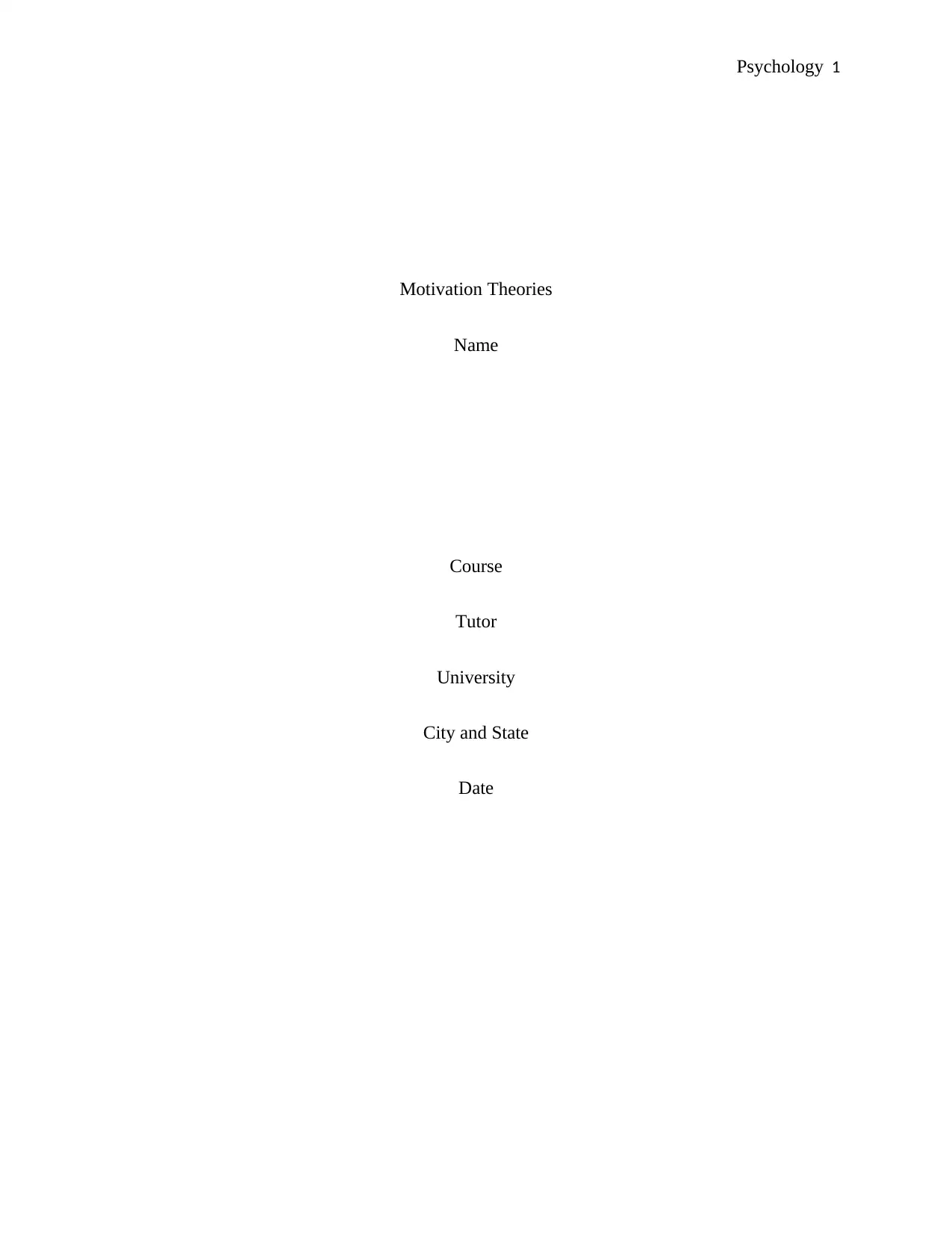
Psychology 1
Motivation Theories
Name
Course
Tutor
University
City and State
Date
Motivation Theories
Name
Course
Tutor
University
City and State
Date
Paraphrase This Document
Need a fresh take? Get an instant paraphrase of this document with our AI Paraphraser
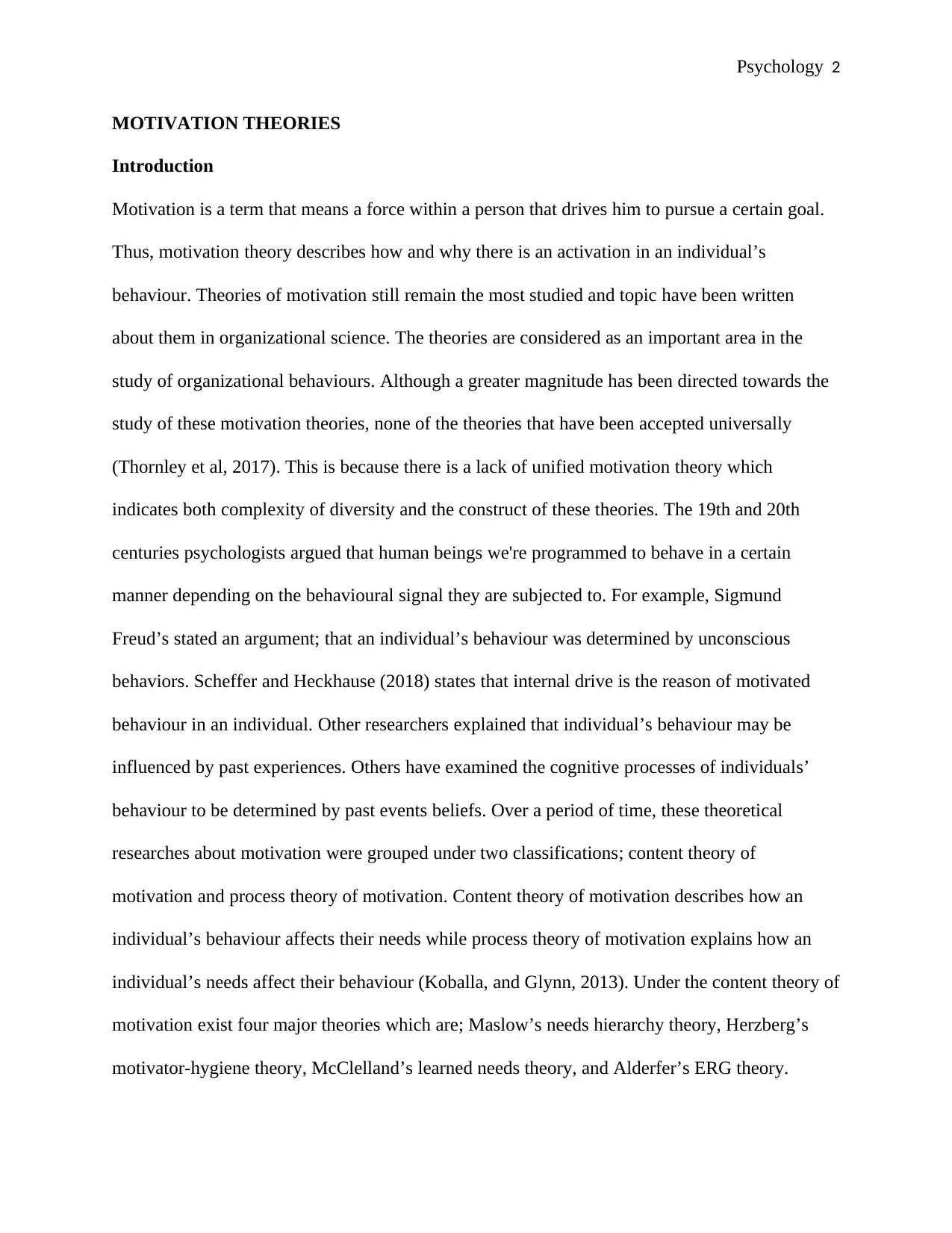
Psychology 2
MOTIVATION THEORIES
Introduction
Motivation is a term that means a force within a person that drives him to pursue a certain goal.
Thus, motivation theory describes how and why there is an activation in an individual’s
behaviour. Theories of motivation still remain the most studied and topic have been written
about them in organizational science. The theories are considered as an important area in the
study of organizational behaviours. Although a greater magnitude has been directed towards the
study of these motivation theories, none of the theories that have been accepted universally
(Thornley et al, 2017). This is because there is a lack of unified motivation theory which
indicates both complexity of diversity and the construct of these theories. The 19th and 20th
centuries psychologists argued that human beings we're programmed to behave in a certain
manner depending on the behavioural signal they are subjected to. For example, Sigmund
Freud’s stated an argument; that an individual’s behaviour was determined by unconscious
behaviors. Scheffer and Heckhause (2018) states that internal drive is the reason of motivated
behaviour in an individual. Other researchers explained that individual’s behaviour may be
influenced by past experiences. Others have examined the cognitive processes of individuals’
behaviour to be determined by past events beliefs. Over a period of time, these theoretical
researches about motivation were grouped under two classifications; content theory of
motivation and process theory of motivation. Content theory of motivation describes how an
individual’s behaviour affects their needs while process theory of motivation explains how an
individual’s needs affect their behaviour (Koballa, and Glynn, 2013). Under the content theory of
motivation exist four major theories which are; Maslow’s needs hierarchy theory, Herzberg’s
motivator-hygiene theory, McClelland’s learned needs theory, and Alderfer’s ERG theory.
MOTIVATION THEORIES
Introduction
Motivation is a term that means a force within a person that drives him to pursue a certain goal.
Thus, motivation theory describes how and why there is an activation in an individual’s
behaviour. Theories of motivation still remain the most studied and topic have been written
about them in organizational science. The theories are considered as an important area in the
study of organizational behaviours. Although a greater magnitude has been directed towards the
study of these motivation theories, none of the theories that have been accepted universally
(Thornley et al, 2017). This is because there is a lack of unified motivation theory which
indicates both complexity of diversity and the construct of these theories. The 19th and 20th
centuries psychologists argued that human beings we're programmed to behave in a certain
manner depending on the behavioural signal they are subjected to. For example, Sigmund
Freud’s stated an argument; that an individual’s behaviour was determined by unconscious
behaviors. Scheffer and Heckhause (2018) states that internal drive is the reason of motivated
behaviour in an individual. Other researchers explained that individual’s behaviour may be
influenced by past experiences. Others have examined the cognitive processes of individuals’
behaviour to be determined by past events beliefs. Over a period of time, these theoretical
researches about motivation were grouped under two classifications; content theory of
motivation and process theory of motivation. Content theory of motivation describes how an
individual’s behaviour affects their needs while process theory of motivation explains how an
individual’s needs affect their behaviour (Koballa, and Glynn, 2013). Under the content theory of
motivation exist four major theories which are; Maslow’s needs hierarchy theory, Herzberg’s
motivator-hygiene theory, McClelland’s learned needs theory, and Alderfer’s ERG theory.
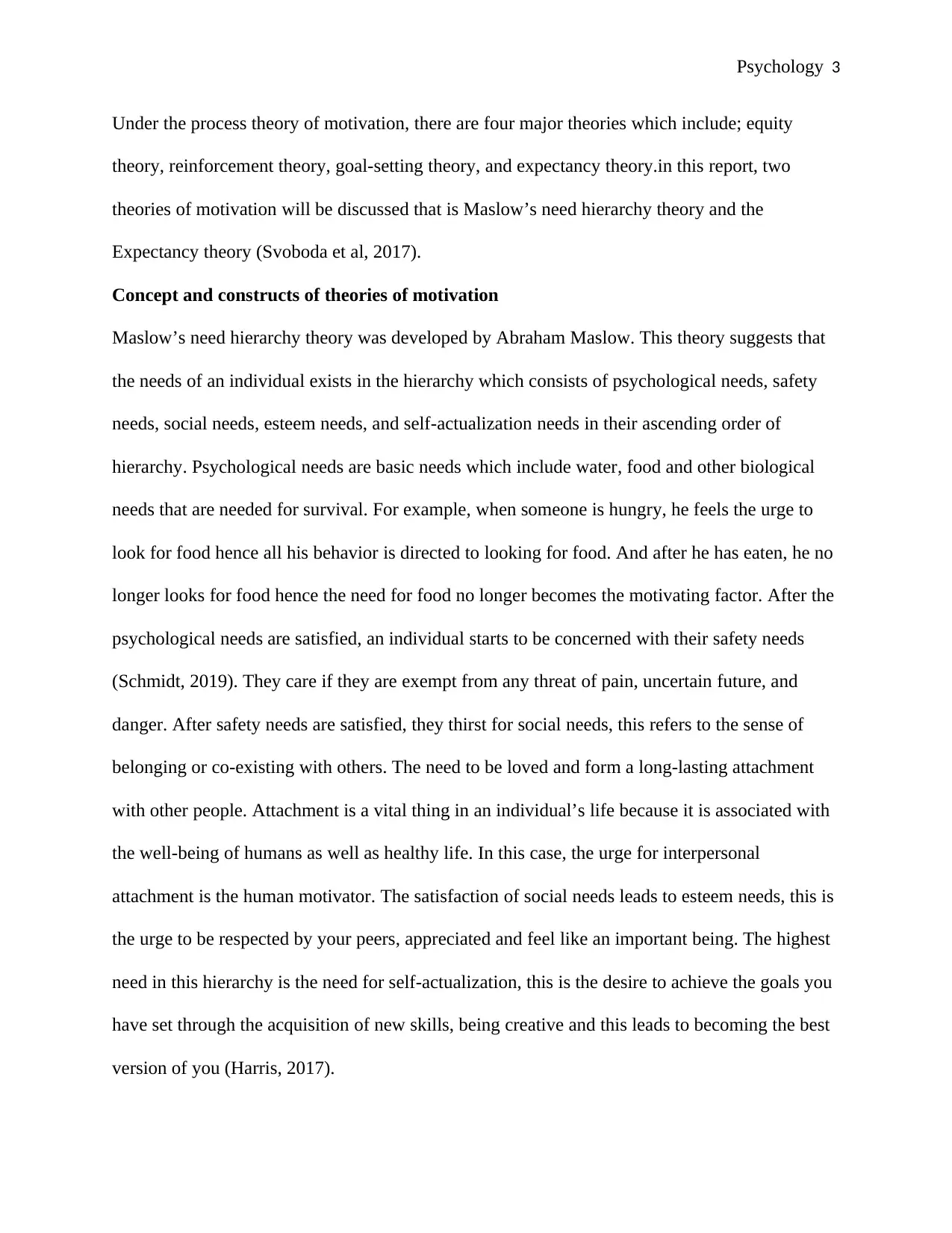
Psychology 3
Under the process theory of motivation, there are four major theories which include; equity
theory, reinforcement theory, goal-setting theory, and expectancy theory.in this report, two
theories of motivation will be discussed that is Maslow’s need hierarchy theory and the
Expectancy theory (Svoboda et al, 2017).
Concept and constructs of theories of motivation
Maslow’s need hierarchy theory was developed by Abraham Maslow. This theory suggests that
the needs of an individual exists in the hierarchy which consists of psychological needs, safety
needs, social needs, esteem needs, and self-actualization needs in their ascending order of
hierarchy. Psychological needs are basic needs which include water, food and other biological
needs that are needed for survival. For example, when someone is hungry, he feels the urge to
look for food hence all his behavior is directed to looking for food. And after he has eaten, he no
longer looks for food hence the need for food no longer becomes the motivating factor. After the
psychological needs are satisfied, an individual starts to be concerned with their safety needs
(Schmidt, 2019). They care if they are exempt from any threat of pain, uncertain future, and
danger. After safety needs are satisfied, they thirst for social needs, this refers to the sense of
belonging or co-existing with others. The need to be loved and form a long-lasting attachment
with other people. Attachment is a vital thing in an individual’s life because it is associated with
the well-being of humans as well as healthy life. In this case, the urge for interpersonal
attachment is the human motivator. The satisfaction of social needs leads to esteem needs, this is
the urge to be respected by your peers, appreciated and feel like an important being. The highest
need in this hierarchy is the need for self-actualization, this is the desire to achieve the goals you
have set through the acquisition of new skills, being creative and this leads to becoming the best
version of you (Harris, 2017).
Under the process theory of motivation, there are four major theories which include; equity
theory, reinforcement theory, goal-setting theory, and expectancy theory.in this report, two
theories of motivation will be discussed that is Maslow’s need hierarchy theory and the
Expectancy theory (Svoboda et al, 2017).
Concept and constructs of theories of motivation
Maslow’s need hierarchy theory was developed by Abraham Maslow. This theory suggests that
the needs of an individual exists in the hierarchy which consists of psychological needs, safety
needs, social needs, esteem needs, and self-actualization needs in their ascending order of
hierarchy. Psychological needs are basic needs which include water, food and other biological
needs that are needed for survival. For example, when someone is hungry, he feels the urge to
look for food hence all his behavior is directed to looking for food. And after he has eaten, he no
longer looks for food hence the need for food no longer becomes the motivating factor. After the
psychological needs are satisfied, an individual starts to be concerned with their safety needs
(Schmidt, 2019). They care if they are exempt from any threat of pain, uncertain future, and
danger. After safety needs are satisfied, they thirst for social needs, this refers to the sense of
belonging or co-existing with others. The need to be loved and form a long-lasting attachment
with other people. Attachment is a vital thing in an individual’s life because it is associated with
the well-being of humans as well as healthy life. In this case, the urge for interpersonal
attachment is the human motivator. The satisfaction of social needs leads to esteem needs, this is
the urge to be respected by your peers, appreciated and feel like an important being. The highest
need in this hierarchy is the need for self-actualization, this is the desire to achieve the goals you
have set through the acquisition of new skills, being creative and this leads to becoming the best
version of you (Harris, 2017).
⊘ This is a preview!⊘
Do you want full access?
Subscribe today to unlock all pages.

Trusted by 1+ million students worldwide
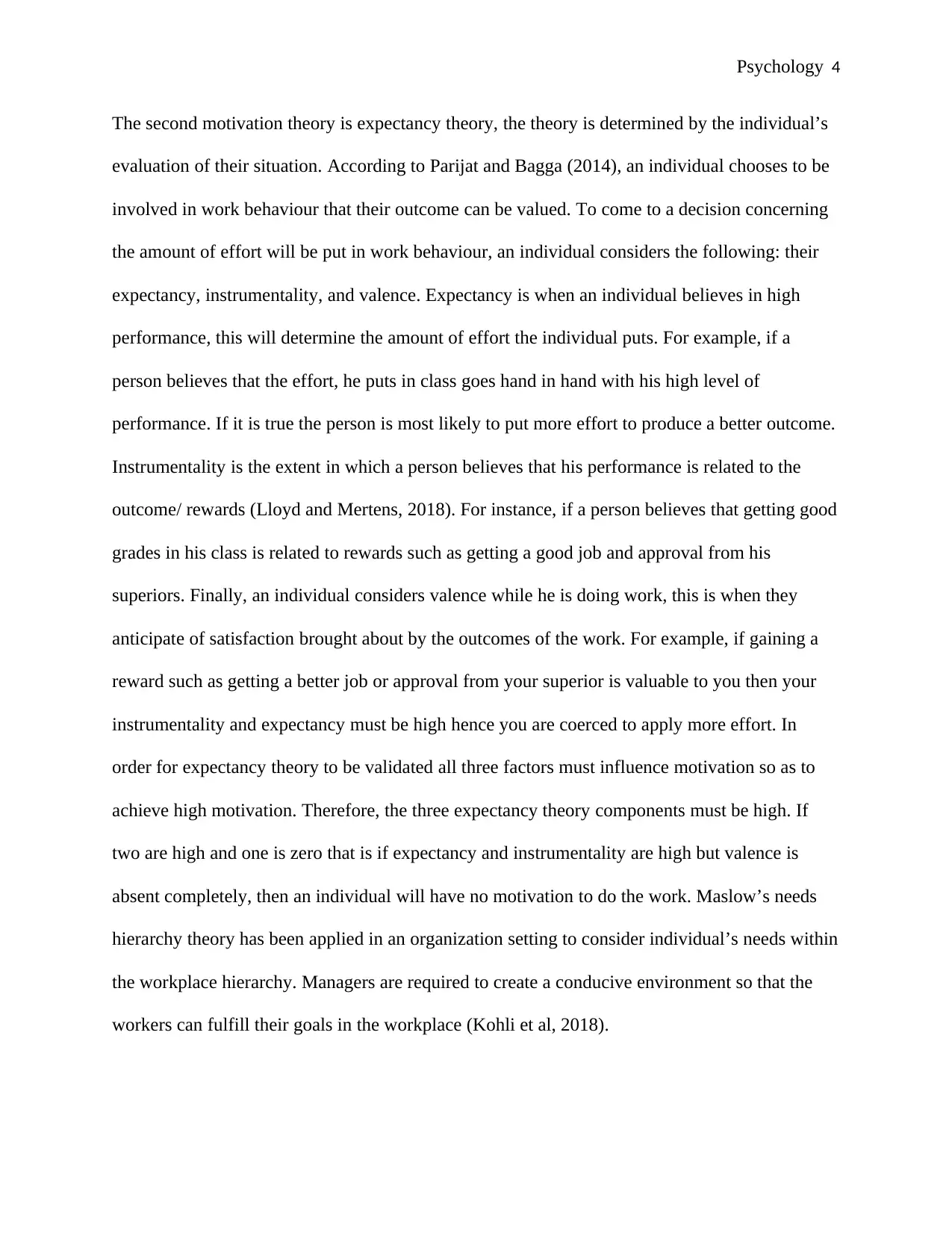
Psychology 4
The second motivation theory is expectancy theory, the theory is determined by the individual’s
evaluation of their situation. According to Parijat and Bagga (2014), an individual chooses to be
involved in work behaviour that their outcome can be valued. To come to a decision concerning
the amount of effort will be put in work behaviour, an individual considers the following: their
expectancy, instrumentality, and valence. Expectancy is when an individual believes in high
performance, this will determine the amount of effort the individual puts. For example, if a
person believes that the effort, he puts in class goes hand in hand with his high level of
performance. If it is true the person is most likely to put more effort to produce a better outcome.
Instrumentality is the extent in which a person believes that his performance is related to the
outcome/ rewards (Lloyd and Mertens, 2018). For instance, if a person believes that getting good
grades in his class is related to rewards such as getting a good job and approval from his
superiors. Finally, an individual considers valence while he is doing work, this is when they
anticipate of satisfaction brought about by the outcomes of the work. For example, if gaining a
reward such as getting a better job or approval from your superior is valuable to you then your
instrumentality and expectancy must be high hence you are coerced to apply more effort. In
order for expectancy theory to be validated all three factors must influence motivation so as to
achieve high motivation. Therefore, the three expectancy theory components must be high. If
two are high and one is zero that is if expectancy and instrumentality are high but valence is
absent completely, then an individual will have no motivation to do the work. Maslow’s needs
hierarchy theory has been applied in an organization setting to consider individual’s needs within
the workplace hierarchy. Managers are required to create a conducive environment so that the
workers can fulfill their goals in the workplace (Kohli et al, 2018).
The second motivation theory is expectancy theory, the theory is determined by the individual’s
evaluation of their situation. According to Parijat and Bagga (2014), an individual chooses to be
involved in work behaviour that their outcome can be valued. To come to a decision concerning
the amount of effort will be put in work behaviour, an individual considers the following: their
expectancy, instrumentality, and valence. Expectancy is when an individual believes in high
performance, this will determine the amount of effort the individual puts. For example, if a
person believes that the effort, he puts in class goes hand in hand with his high level of
performance. If it is true the person is most likely to put more effort to produce a better outcome.
Instrumentality is the extent in which a person believes that his performance is related to the
outcome/ rewards (Lloyd and Mertens, 2018). For instance, if a person believes that getting good
grades in his class is related to rewards such as getting a good job and approval from his
superiors. Finally, an individual considers valence while he is doing work, this is when they
anticipate of satisfaction brought about by the outcomes of the work. For example, if gaining a
reward such as getting a better job or approval from your superior is valuable to you then your
instrumentality and expectancy must be high hence you are coerced to apply more effort. In
order for expectancy theory to be validated all three factors must influence motivation so as to
achieve high motivation. Therefore, the three expectancy theory components must be high. If
two are high and one is zero that is if expectancy and instrumentality are high but valence is
absent completely, then an individual will have no motivation to do the work. Maslow’s needs
hierarchy theory has been applied in an organization setting to consider individual’s needs within
the workplace hierarchy. Managers are required to create a conducive environment so that the
workers can fulfill their goals in the workplace (Kohli et al, 2018).
Paraphrase This Document
Need a fresh take? Get an instant paraphrase of this document with our AI Paraphraser
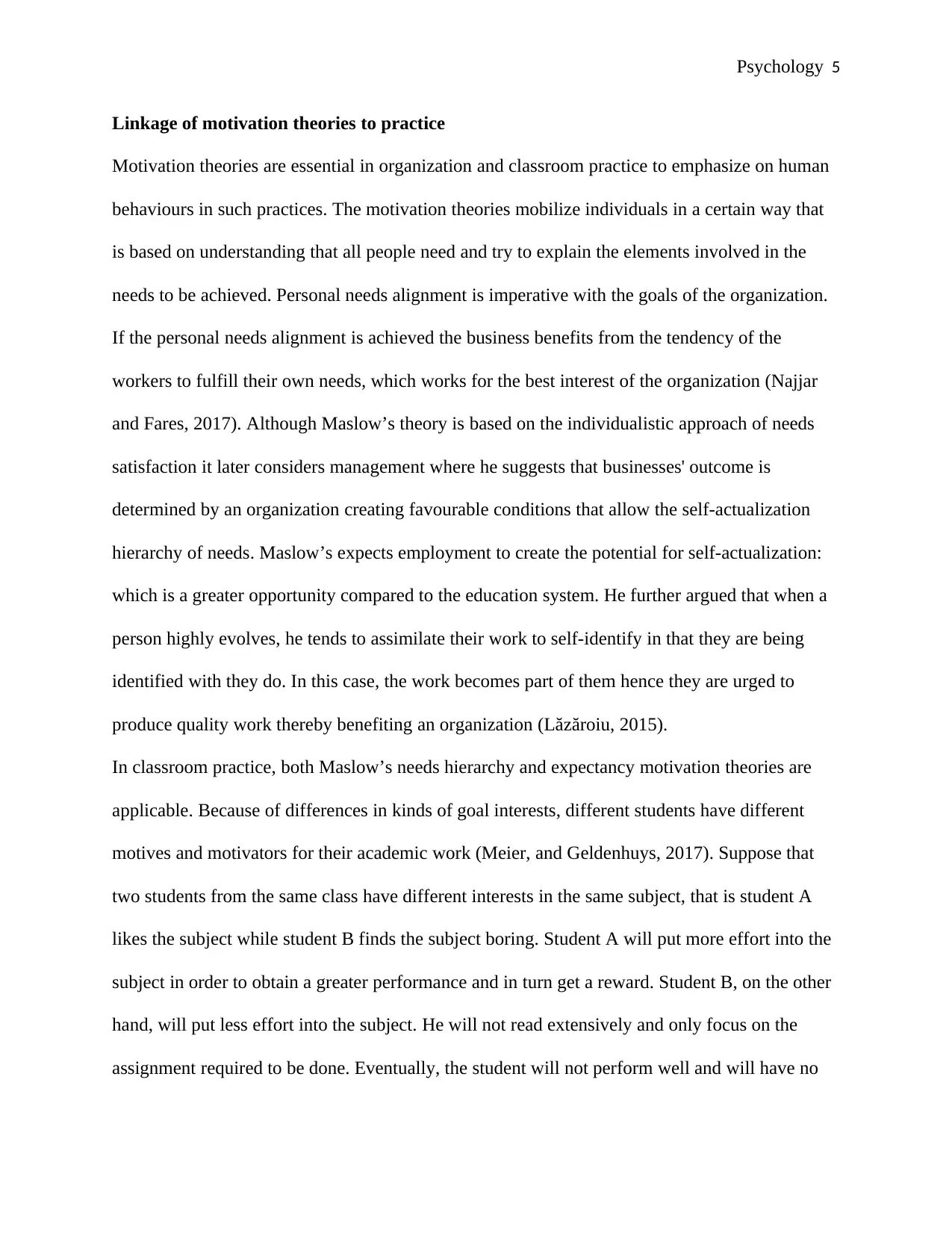
Psychology 5
Linkage of motivation theories to practice
Motivation theories are essential in organization and classroom practice to emphasize on human
behaviours in such practices. The motivation theories mobilize individuals in a certain way that
is based on understanding that all people need and try to explain the elements involved in the
needs to be achieved. Personal needs alignment is imperative with the goals of the organization.
If the personal needs alignment is achieved the business benefits from the tendency of the
workers to fulfill their own needs, which works for the best interest of the organization (Najjar
and Fares, 2017). Although Maslow’s theory is based on the individualistic approach of needs
satisfaction it later considers management where he suggests that businesses' outcome is
determined by an organization creating favourable conditions that allow the self-actualization
hierarchy of needs. Maslow’s expects employment to create the potential for self-actualization:
which is a greater opportunity compared to the education system. He further argued that when a
person highly evolves, he tends to assimilate their work to self-identify in that they are being
identified with they do. In this case, the work becomes part of them hence they are urged to
produce quality work thereby benefiting an organization (Lăzăroiu, 2015).
In classroom practice, both Maslow’s needs hierarchy and expectancy motivation theories are
applicable. Because of differences in kinds of goal interests, different students have different
motives and motivators for their academic work (Meier, and Geldenhuys, 2017). Suppose that
two students from the same class have different interests in the same subject, that is student A
likes the subject while student B finds the subject boring. Student A will put more effort into the
subject in order to obtain a greater performance and in turn get a reward. Student B, on the other
hand, will put less effort into the subject. He will not read extensively and only focus on the
assignment required to be done. Eventually, the student will not perform well and will have no
Linkage of motivation theories to practice
Motivation theories are essential in organization and classroom practice to emphasize on human
behaviours in such practices. The motivation theories mobilize individuals in a certain way that
is based on understanding that all people need and try to explain the elements involved in the
needs to be achieved. Personal needs alignment is imperative with the goals of the organization.
If the personal needs alignment is achieved the business benefits from the tendency of the
workers to fulfill their own needs, which works for the best interest of the organization (Najjar
and Fares, 2017). Although Maslow’s theory is based on the individualistic approach of needs
satisfaction it later considers management where he suggests that businesses' outcome is
determined by an organization creating favourable conditions that allow the self-actualization
hierarchy of needs. Maslow’s expects employment to create the potential for self-actualization:
which is a greater opportunity compared to the education system. He further argued that when a
person highly evolves, he tends to assimilate their work to self-identify in that they are being
identified with they do. In this case, the work becomes part of them hence they are urged to
produce quality work thereby benefiting an organization (Lăzăroiu, 2015).
In classroom practice, both Maslow’s needs hierarchy and expectancy motivation theories are
applicable. Because of differences in kinds of goal interests, different students have different
motives and motivators for their academic work (Meier, and Geldenhuys, 2017). Suppose that
two students from the same class have different interests in the same subject, that is student A
likes the subject while student B finds the subject boring. Student A will put more effort into the
subject in order to obtain a greater performance and in turn get a reward. Student B, on the other
hand, will put less effort into the subject. He will not read extensively and only focus on the
assignment required to be done. Eventually, the student will not perform well and will have no
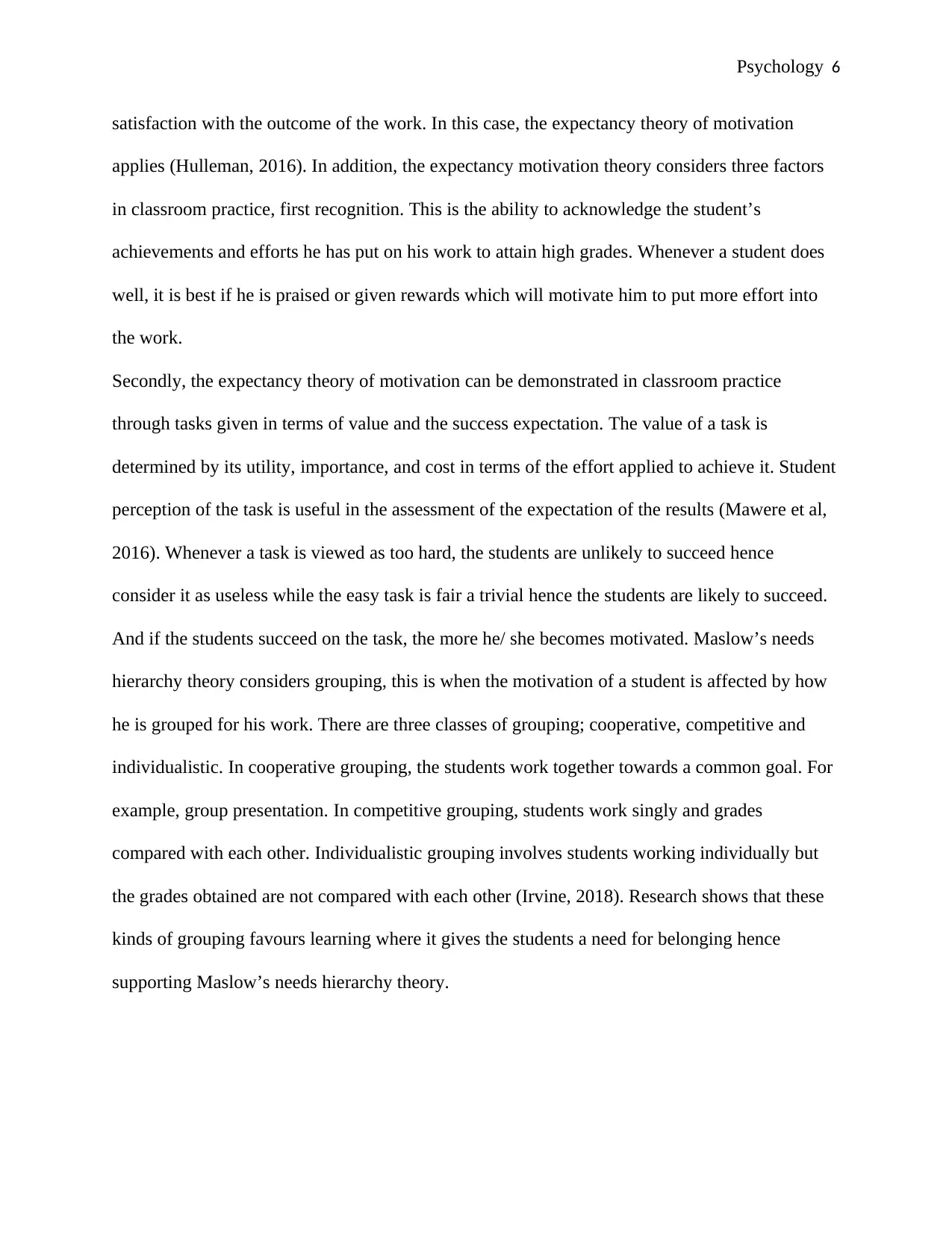
Psychology 6
satisfaction with the outcome of the work. In this case, the expectancy theory of motivation
applies (Hulleman, 2016). In addition, the expectancy motivation theory considers three factors
in classroom practice, first recognition. This is the ability to acknowledge the student’s
achievements and efforts he has put on his work to attain high grades. Whenever a student does
well, it is best if he is praised or given rewards which will motivate him to put more effort into
the work.
Secondly, the expectancy theory of motivation can be demonstrated in classroom practice
through tasks given in terms of value and the success expectation. The value of a task is
determined by its utility, importance, and cost in terms of the effort applied to achieve it. Student
perception of the task is useful in the assessment of the expectation of the results (Mawere et al,
2016). Whenever a task is viewed as too hard, the students are unlikely to succeed hence
consider it as useless while the easy task is fair a trivial hence the students are likely to succeed.
And if the students succeed on the task, the more he/ she becomes motivated. Maslow’s needs
hierarchy theory considers grouping, this is when the motivation of a student is affected by how
he is grouped for his work. There are three classes of grouping; cooperative, competitive and
individualistic. In cooperative grouping, the students work together towards a common goal. For
example, group presentation. In competitive grouping, students work singly and grades
compared with each other. Individualistic grouping involves students working individually but
the grades obtained are not compared with each other (Irvine, 2018). Research shows that these
kinds of grouping favours learning where it gives the students a need for belonging hence
supporting Maslow’s needs hierarchy theory.
satisfaction with the outcome of the work. In this case, the expectancy theory of motivation
applies (Hulleman, 2016). In addition, the expectancy motivation theory considers three factors
in classroom practice, first recognition. This is the ability to acknowledge the student’s
achievements and efforts he has put on his work to attain high grades. Whenever a student does
well, it is best if he is praised or given rewards which will motivate him to put more effort into
the work.
Secondly, the expectancy theory of motivation can be demonstrated in classroom practice
through tasks given in terms of value and the success expectation. The value of a task is
determined by its utility, importance, and cost in terms of the effort applied to achieve it. Student
perception of the task is useful in the assessment of the expectation of the results (Mawere et al,
2016). Whenever a task is viewed as too hard, the students are unlikely to succeed hence
consider it as useless while the easy task is fair a trivial hence the students are likely to succeed.
And if the students succeed on the task, the more he/ she becomes motivated. Maslow’s needs
hierarchy theory considers grouping, this is when the motivation of a student is affected by how
he is grouped for his work. There are three classes of grouping; cooperative, competitive and
individualistic. In cooperative grouping, the students work together towards a common goal. For
example, group presentation. In competitive grouping, students work singly and grades
compared with each other. Individualistic grouping involves students working individually but
the grades obtained are not compared with each other (Irvine, 2018). Research shows that these
kinds of grouping favours learning where it gives the students a need for belonging hence
supporting Maslow’s needs hierarchy theory.
⊘ This is a preview!⊘
Do you want full access?
Subscribe today to unlock all pages.

Trusted by 1+ million students worldwide
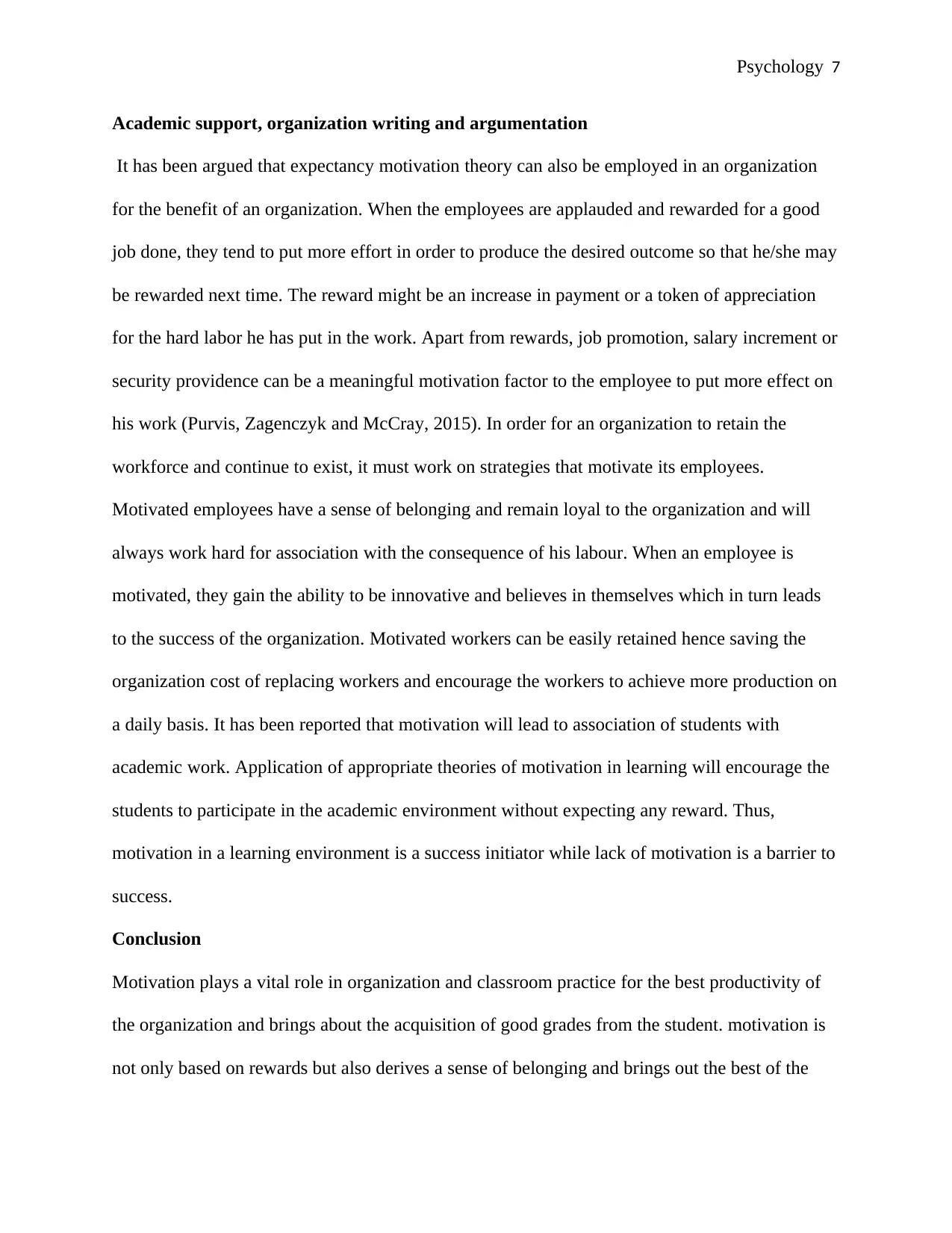
Psychology 7
Academic support, organization writing and argumentation
It has been argued that expectancy motivation theory can also be employed in an organization
for the benefit of an organization. When the employees are applauded and rewarded for a good
job done, they tend to put more effort in order to produce the desired outcome so that he/she may
be rewarded next time. The reward might be an increase in payment or a token of appreciation
for the hard labor he has put in the work. Apart from rewards, job promotion, salary increment or
security providence can be a meaningful motivation factor to the employee to put more effect on
his work (Purvis, Zagenczyk and McCray, 2015). In order for an organization to retain the
workforce and continue to exist, it must work on strategies that motivate its employees.
Motivated employees have a sense of belonging and remain loyal to the organization and will
always work hard for association with the consequence of his labour. When an employee is
motivated, they gain the ability to be innovative and believes in themselves which in turn leads
to the success of the organization. Motivated workers can be easily retained hence saving the
organization cost of replacing workers and encourage the workers to achieve more production on
a daily basis. It has been reported that motivation will lead to association of students with
academic work. Application of appropriate theories of motivation in learning will encourage the
students to participate in the academic environment without expecting any reward. Thus,
motivation in a learning environment is a success initiator while lack of motivation is a barrier to
success.
Conclusion
Motivation plays a vital role in organization and classroom practice for the best productivity of
the organization and brings about the acquisition of good grades from the student. motivation is
not only based on rewards but also derives a sense of belonging and brings out the best of the
Academic support, organization writing and argumentation
It has been argued that expectancy motivation theory can also be employed in an organization
for the benefit of an organization. When the employees are applauded and rewarded for a good
job done, they tend to put more effort in order to produce the desired outcome so that he/she may
be rewarded next time. The reward might be an increase in payment or a token of appreciation
for the hard labor he has put in the work. Apart from rewards, job promotion, salary increment or
security providence can be a meaningful motivation factor to the employee to put more effect on
his work (Purvis, Zagenczyk and McCray, 2015). In order for an organization to retain the
workforce and continue to exist, it must work on strategies that motivate its employees.
Motivated employees have a sense of belonging and remain loyal to the organization and will
always work hard for association with the consequence of his labour. When an employee is
motivated, they gain the ability to be innovative and believes in themselves which in turn leads
to the success of the organization. Motivated workers can be easily retained hence saving the
organization cost of replacing workers and encourage the workers to achieve more production on
a daily basis. It has been reported that motivation will lead to association of students with
academic work. Application of appropriate theories of motivation in learning will encourage the
students to participate in the academic environment without expecting any reward. Thus,
motivation in a learning environment is a success initiator while lack of motivation is a barrier to
success.
Conclusion
Motivation plays a vital role in organization and classroom practice for the best productivity of
the organization and brings about the acquisition of good grades from the student. motivation is
not only based on rewards but also derives a sense of belonging and brings out the best of the
Paraphrase This Document
Need a fresh take? Get an instant paraphrase of this document with our AI Paraphraser
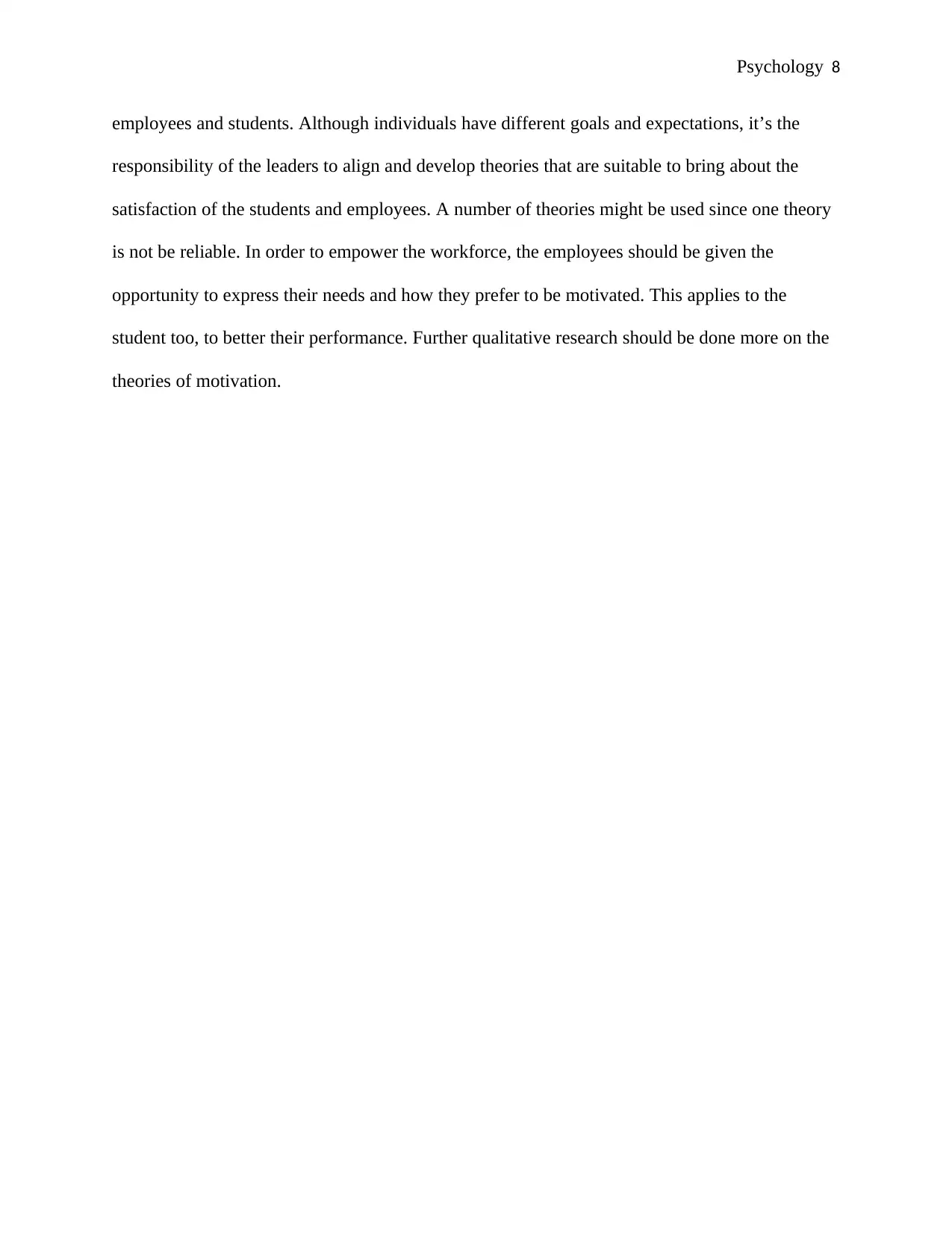
Psychology 8
employees and students. Although individuals have different goals and expectations, it’s the
responsibility of the leaders to align and develop theories that are suitable to bring about the
satisfaction of the students and employees. A number of theories might be used since one theory
is not be reliable. In order to empower the workforce, the employees should be given the
opportunity to express their needs and how they prefer to be motivated. This applies to the
student too, to better their performance. Further qualitative research should be done more on the
theories of motivation.
employees and students. Although individuals have different goals and expectations, it’s the
responsibility of the leaders to align and develop theories that are suitable to bring about the
satisfaction of the students and employees. A number of theories might be used since one theory
is not be reliable. In order to empower the workforce, the employees should be given the
opportunity to express their needs and how they prefer to be motivated. This applies to the
student too, to better their performance. Further qualitative research should be done more on the
theories of motivation.
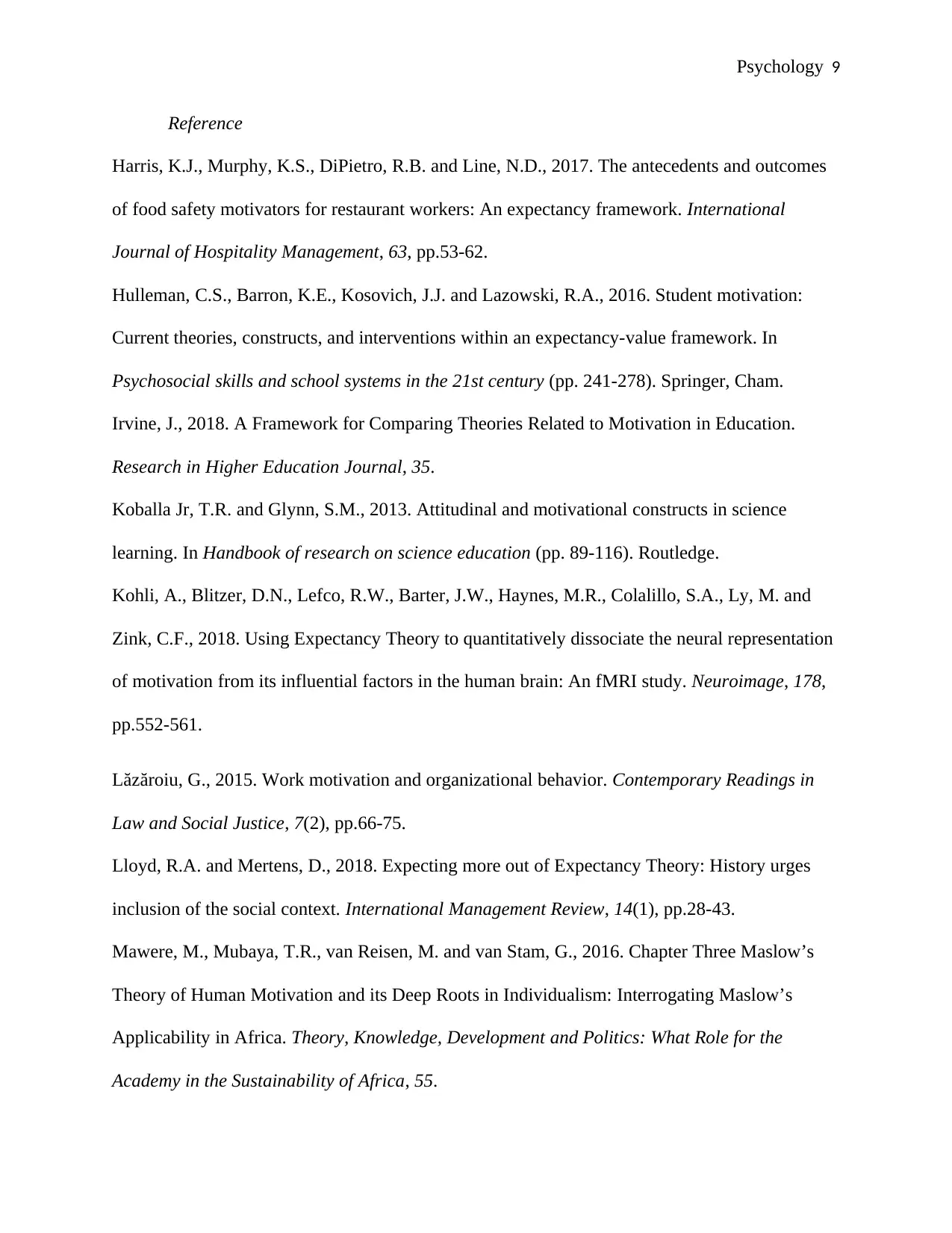
Psychology 9
Reference
Harris, K.J., Murphy, K.S., DiPietro, R.B. and Line, N.D., 2017. The antecedents and outcomes
of food safety motivators for restaurant workers: An expectancy framework. International
Journal of Hospitality Management, 63, pp.53-62.
Hulleman, C.S., Barron, K.E., Kosovich, J.J. and Lazowski, R.A., 2016. Student motivation:
Current theories, constructs, and interventions within an expectancy-value framework. In
Psychosocial skills and school systems in the 21st century (pp. 241-278). Springer, Cham.
Irvine, J., 2018. A Framework for Comparing Theories Related to Motivation in Education.
Research in Higher Education Journal, 35.
Koballa Jr, T.R. and Glynn, S.M., 2013. Attitudinal and motivational constructs in science
learning. In Handbook of research on science education (pp. 89-116). Routledge.
Kohli, A., Blitzer, D.N., Lefco, R.W., Barter, J.W., Haynes, M.R., Colalillo, S.A., Ly, M. and
Zink, C.F., 2018. Using Expectancy Theory to quantitatively dissociate the neural representation
of motivation from its influential factors in the human brain: An fMRI study. Neuroimage, 178,
pp.552-561.
Lăzăroiu, G., 2015. Work motivation and organizational behavior. Contemporary Readings in
Law and Social Justice, 7(2), pp.66-75.
Lloyd, R.A. and Mertens, D., 2018. Expecting more out of Expectancy Theory: History urges
inclusion of the social context. International Management Review, 14(1), pp.28-43.
Mawere, M., Mubaya, T.R., van Reisen, M. and van Stam, G., 2016. Chapter Three Maslow’s
Theory of Human Motivation and its Deep Roots in Individualism: Interrogating Maslow’s
Applicability in Africa. Theory, Knowledge, Development and Politics: What Role for the
Academy in the Sustainability of Africa, 55.
Reference
Harris, K.J., Murphy, K.S., DiPietro, R.B. and Line, N.D., 2017. The antecedents and outcomes
of food safety motivators for restaurant workers: An expectancy framework. International
Journal of Hospitality Management, 63, pp.53-62.
Hulleman, C.S., Barron, K.E., Kosovich, J.J. and Lazowski, R.A., 2016. Student motivation:
Current theories, constructs, and interventions within an expectancy-value framework. In
Psychosocial skills and school systems in the 21st century (pp. 241-278). Springer, Cham.
Irvine, J., 2018. A Framework for Comparing Theories Related to Motivation in Education.
Research in Higher Education Journal, 35.
Koballa Jr, T.R. and Glynn, S.M., 2013. Attitudinal and motivational constructs in science
learning. In Handbook of research on science education (pp. 89-116). Routledge.
Kohli, A., Blitzer, D.N., Lefco, R.W., Barter, J.W., Haynes, M.R., Colalillo, S.A., Ly, M. and
Zink, C.F., 2018. Using Expectancy Theory to quantitatively dissociate the neural representation
of motivation from its influential factors in the human brain: An fMRI study. Neuroimage, 178,
pp.552-561.
Lăzăroiu, G., 2015. Work motivation and organizational behavior. Contemporary Readings in
Law and Social Justice, 7(2), pp.66-75.
Lloyd, R.A. and Mertens, D., 2018. Expecting more out of Expectancy Theory: History urges
inclusion of the social context. International Management Review, 14(1), pp.28-43.
Mawere, M., Mubaya, T.R., van Reisen, M. and van Stam, G., 2016. Chapter Three Maslow’s
Theory of Human Motivation and its Deep Roots in Individualism: Interrogating Maslow’s
Applicability in Africa. Theory, Knowledge, Development and Politics: What Role for the
Academy in the Sustainability of Africa, 55.
⊘ This is a preview!⊘
Do you want full access?
Subscribe today to unlock all pages.

Trusted by 1+ million students worldwide
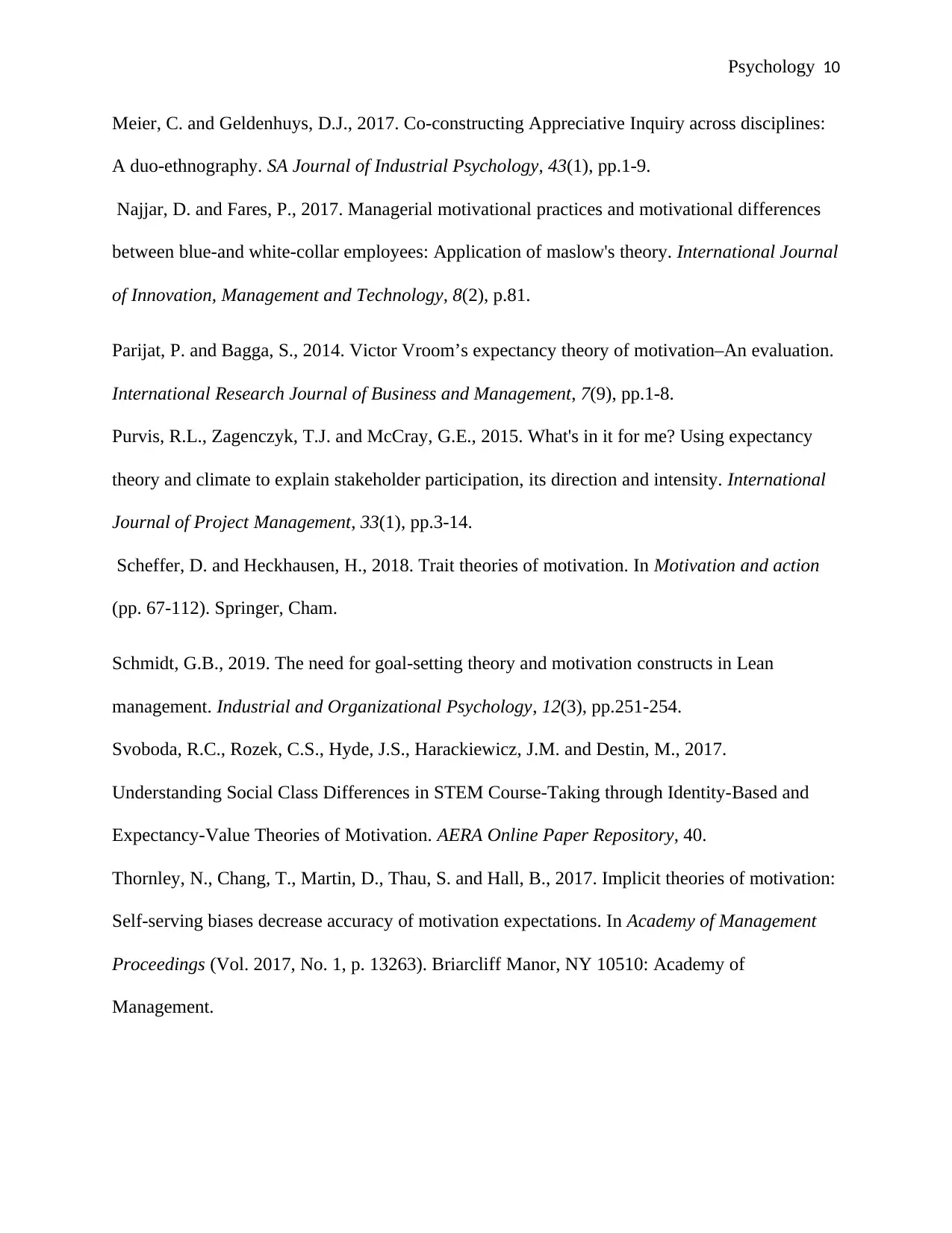
Psychology 10
Meier, C. and Geldenhuys, D.J., 2017. Co-constructing Appreciative Inquiry across disciplines:
A duo-ethnography. SA Journal of Industrial Psychology, 43(1), pp.1-9.
Najjar, D. and Fares, P., 2017. Managerial motivational practices and motivational differences
between blue-and white-collar employees: Application of maslow's theory. International Journal
of Innovation, Management and Technology, 8(2), p.81.
Parijat, P. and Bagga, S., 2014. Victor Vroom’s expectancy theory of motivation–An evaluation.
International Research Journal of Business and Management, 7(9), pp.1-8.
Purvis, R.L., Zagenczyk, T.J. and McCray, G.E., 2015. What's in it for me? Using expectancy
theory and climate to explain stakeholder participation, its direction and intensity. International
Journal of Project Management, 33(1), pp.3-14.
Scheffer, D. and Heckhausen, H., 2018. Trait theories of motivation. In Motivation and action
(pp. 67-112). Springer, Cham.
Schmidt, G.B., 2019. The need for goal-setting theory and motivation constructs in Lean
management. Industrial and Organizational Psychology, 12(3), pp.251-254.
Svoboda, R.C., Rozek, C.S., Hyde, J.S., Harackiewicz, J.M. and Destin, M., 2017.
Understanding Social Class Differences in STEM Course-Taking through Identity-Based and
Expectancy-Value Theories of Motivation. AERA Online Paper Repository, 40.
Thornley, N., Chang, T., Martin, D., Thau, S. and Hall, B., 2017. Implicit theories of motivation:
Self-serving biases decrease accuracy of motivation expectations. In Academy of Management
Proceedings (Vol. 2017, No. 1, p. 13263). Briarcliff Manor, NY 10510: Academy of
Management.
Meier, C. and Geldenhuys, D.J., 2017. Co-constructing Appreciative Inquiry across disciplines:
A duo-ethnography. SA Journal of Industrial Psychology, 43(1), pp.1-9.
Najjar, D. and Fares, P., 2017. Managerial motivational practices and motivational differences
between blue-and white-collar employees: Application of maslow's theory. International Journal
of Innovation, Management and Technology, 8(2), p.81.
Parijat, P. and Bagga, S., 2014. Victor Vroom’s expectancy theory of motivation–An evaluation.
International Research Journal of Business and Management, 7(9), pp.1-8.
Purvis, R.L., Zagenczyk, T.J. and McCray, G.E., 2015. What's in it for me? Using expectancy
theory and climate to explain stakeholder participation, its direction and intensity. International
Journal of Project Management, 33(1), pp.3-14.
Scheffer, D. and Heckhausen, H., 2018. Trait theories of motivation. In Motivation and action
(pp. 67-112). Springer, Cham.
Schmidt, G.B., 2019. The need for goal-setting theory and motivation constructs in Lean
management. Industrial and Organizational Psychology, 12(3), pp.251-254.
Svoboda, R.C., Rozek, C.S., Hyde, J.S., Harackiewicz, J.M. and Destin, M., 2017.
Understanding Social Class Differences in STEM Course-Taking through Identity-Based and
Expectancy-Value Theories of Motivation. AERA Online Paper Repository, 40.
Thornley, N., Chang, T., Martin, D., Thau, S. and Hall, B., 2017. Implicit theories of motivation:
Self-serving biases decrease accuracy of motivation expectations. In Academy of Management
Proceedings (Vol. 2017, No. 1, p. 13263). Briarcliff Manor, NY 10510: Academy of
Management.
1 out of 10
Related Documents
Your All-in-One AI-Powered Toolkit for Academic Success.
+13062052269
info@desklib.com
Available 24*7 on WhatsApp / Email
![[object Object]](/_next/static/media/star-bottom.7253800d.svg)
Unlock your academic potential
Copyright © 2020–2026 A2Z Services. All Rights Reserved. Developed and managed by ZUCOL.




